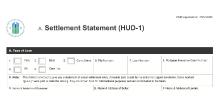CARL WATTS & ASSOCIATES
October 15, 2012

|
Washington DC
|
tel/fax 202 350-9002 |
The Mortgage Settlement
and Taxes
and Taxes
|
Troubles viewing this message? View in browser online here
|
|
From the buyer’s point of view, once you become a house-owner with a mortgage your tax return changes dramatically since you qualify for Schedule A deductions.
|

Interest
As a new homeowner you must usually pay interest in advance on a mortgage until you receive the bill for your first monthly mortgage installment. |
|
A lender will list this amount on line 901 of a HUD-1 Settlement Statement. If you prepay to the lender interest in the form of points to lower the interest rate on your mortgage, line 802 of your HUD-1 Statement will show the amount of prepayment. You can take a deduction for interest charges on your HUD-1 on line 11 or line 12 of Form 1040, Schedule A.
|
|
Insurance
The lender usually requires the homeowner to make upfront payments for mortgage insurance premiums for a variable amount of time depending upon the homeowner’s credit history and down payment amount. You can only deduct these advance premiums, listed on 901 of his HUD-1 Statement, for the years in which you would have paid them. For example, if you pay two years' worth of advance premiums at closing you must take a deduction for premiums paid over two tax years. You can deduct these amounts on line 13 of Form 1040, Schedule A. |
|
Property Tax
As a new homeowner you can deduct city and county property taxes listed on lines 106 and 107 of your HUD-1 Settlement Statement. You will usually pay these taxes to the seller if the seller has already paid property taxes for the remainder of the tax year. The IRS allows you to take a deduction for property taxes on line 6 of Form 1040, Schedule A. |
|
You cannot deduct any amounts you paid at closing for property tax assessments on line 108 that a municipality charged you for the installation and improvement of sidewalks, utilities and other amenities, but you can add them to the cost basis of your home.
Also, all of what you paid in mortgage interest and property taxes may not appear on the HUD-1 statement, so wait until you get your 1099 Form from your mortgage company before you take the deductions. |
|
Capitalized Costs
Capitalized costs on your HUD-1 are those that can be deducted on your tax return, but not all at once. You will have to divide the amount into the useful life of your property as designated by the Internal Revenue Service, with the remainder, if any, deducted at the time that you sell it. A common capitalized cost is depreciation of improvements to the property, such as your house structure. Others on the HUD-1 include settlement fees, title insurance, recording fees and real estate agent commissions. |
|
Although buyers get the most deductions out of the HUD-1 statement, sellers have their fair share, too.
|
|
Even though you cannot deduct almost all fees paid when you close on your home, you can add them to the cost basis of your home for tax purposes, according to the Internal Revenue Service. This can save you money if you sell your home for more than you paid in a future year and owe capital gains tax. For example, if you purchased a property for $100,000, paid $5,000 in closing costs, and sold the home for $150,000 in a year, you would only owe capital gains tax on $45,000 of your profits.
|
|
Starting with your contract sales price on line 101, you can add local investment district (LID) assessments, sales and real estate broker commissions, appraisal fees, credit report fee, home inspection fee, settlement fees, abstract or title search fees, title examination, title insurance binder, document preparation fees, notary fees, attorney fees, title insurance, recording fees, city or county tax stamps, survey and pest inspection fees. Other miscellaneous fees may be added to the cost basis.
|
|
If you paid points when refinancing your home and are now selling, you can deduct the remainder of your unamortized points that tax year. You can also deduct any property taxes that you paid on the home for the year, in addition to your mortgage interest.
|
|
Keep in mind that mortgage interest is only deductible on your primary residence. Second mortgage loans are only deductible up to the first $100,000.
|
|
Your real estate broker's commission is not deductible. But the IRS recognizes that this is a considerable seller expense, and it provides a remedy. You can add real estate commissions, as well as costs of major home repairs, to the purchase price. This adjusted cost basis reduces your gain on the sale, and if your gain is greater than $500,000, then you'll be glad you took the time to make the calculation. The IRS doesn't tax gains less than this amount, so if your broker fees and your repairs reduce the gain, then you won't owe extra income tax.
|

There are also specific items you can add to your cost basis for a rental property.
|
|
Starting with your contract sales price on line 101, you can add local investment district (LID) assessments, sales and real estate broker commissions, appraisal fees, credit report fee, home inspection fee, settlement fees, abstract or title search fees, title examination, title insurance binder, document preparation fees, notary fees, attorney fees, title insurance, recording fees, city or county tax stamps, survey and pest inspection fees.
|
|
Line 106: city taxes, line 107: county taxes, line 108: assessments other than local investment district (LID) assessments are deductible. Line 901: prorated interest, line 903: hazard insurance, and line 1001: hazard insurance reserves become deductible when paid from escrow. Line 1003: city taxes when paid from escrow and line 1003: county taxes when paid from escrow, are all deductible as business expenses on rental properties. Other miscellaneous fees may be added to the cost basis.
|
|
Considering all of the above, with all the many potential tax deductions available throughout the HUD-1 closing statement, determining which expenses are available for you to use depend, most times, on the advice and help you can get from the qualified professionals
Whether buying or selling, help from qualified professionals will be invaluable and crucial to your making the best and most profitable deal of buying or selling a home or porperty. |
 |

|
The Real Estate Settlement Procedures Act (RESPA) requires that a standard real estate settlement form be used in all transactions which involve federally related mortgage loans - that form is HUD-1
. |
||||||||||||||||||||||||||||||||||||||||||||||||||||||||||||||||||||||
 |
||||||||||||||||||||||||||||||||||||||||||||||||||||||||||||||||||||||
|
The HUD-1 is a standardized form which allows real estate buyers and sellers to clearly understand the costs of their transaction. Basically the HUD-1 itemizes all costs and fees involved with the financing of a property (even fees paid prior to closing).
|
||||||||||||||||||||||||||||||||||||||||||||||||||||||||||||||||||||||
|
Since January 1st, 2010, all real estate transactions have been settled using a new HUD-1. (Click the link for an online form HUD-1 form).
|
||||||||||||||||||||||||||||||||||||||||||||||||||||||||||||||||||||||
|
The new HUD-1 is supposed to be a vast improvement over the old model. It’s three letter-sized pages long rather than two legal pages, but there’s much more information in the new HUD-1. The form contains an accounting of closing costs and perhaps even some write-offs. Buyers can find the full and complete cost of buying real estate while sellers can see how much cash they’re getting from the transaction.
|
||||||||||||||||||||||||||||||||||||||||||||||||||||||||||||||||||||||
|
||||||||||||||||||||||||||||||||||||||||||||||||||||||||||||||||||||||
|
|
||||||||||||||||||||||||||||||||||||||||||||||||||||||||||||||||||||||
|
||||||||||||||||||||||||||||||||||||||||||||||||||||||||||||||||||||||
|
The top of the page (Sections A through I) contains basic administrative information such as loan type and the name and address of the borrower, seller, and lender, the property location, the name and address of the settlement agent, the place of settlement and the date of closing.
|
||||||||||||||||||||||||||||||||||||||||||||||||||||||||||||||||||||||
|
||||||||||||||||||||||||||||||||||||||||||||||||||||||||||||||||||||||
|
So which (if any) of these sub-sections (and amounts) mentioned above are of interest for your tax return?
|
||||||||||||||||||||||||||||||||||||||||||||||||||||||||||||||||||||||

